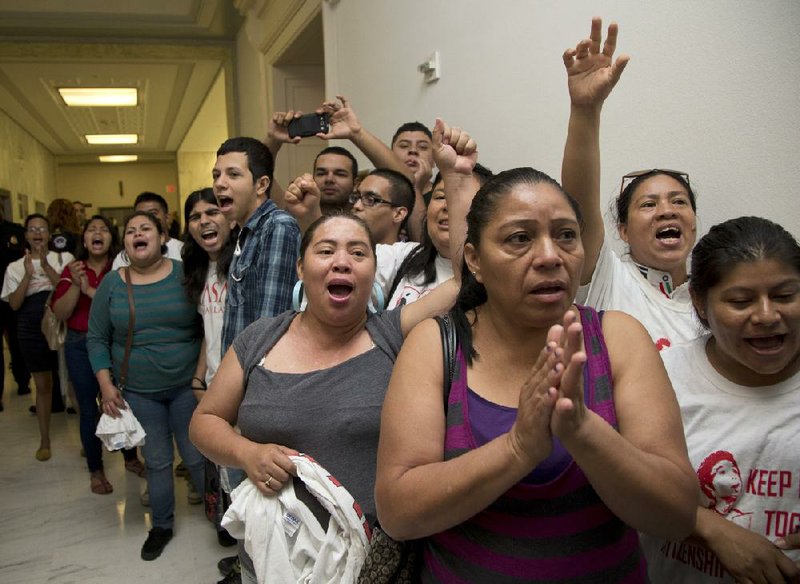WASHINGTON - A key committee in the Republican-led House approved a tough enforcement-focused immigration bill Tuesday over objections from Democrats and disruptions from protesters shouting “Shame, shame, shame!”
The House Judiciary Committee voted 20-15 to support the legislation, which would make it a federal crime to be in the country illegally, instead of a civil offense. It also would empower state and local officials to enforce federal immigration laws.
Meanwhile in the Senate, a Republican lawmaker floated a compromise border-security proposal he hopes can win over support for sweeping immigration legislation under consideration there that opens the door to citizenship for 11 million people now here illegally.
And on a day of fast-paced developments on an issue that is a top priority for President Barack Obama, House Speaker John Boehner, R-Ohio, moved to quiet speculation that he might bring the Senate immigration legislation up for a vote despite opposition from many conservatives in his chamber.
“Any immigration reform bill that is going to go into law ought to have a majority of both parties’ support if we’re really serious about making that happen. And so I don’t see any way of bringing an immigration bill to the floor that doesn’t have a majority support of Republicans,” Boehner said. He added that border enforcement would be key for any immigration bill, “And I frankly think the Senate bill is weak on border security.”
Rep. Dana Rohrabacher of California said earlier that Boehner should be ousted if he pushes the legislation through the chamber without the Republican majority’s support.
As Boehner addressed reporters, the House Judiciary Committee met to consider the bill by Rep. Trey Gowdy, R-S.C., called the Strengthen and Fortify Enforcement Act.
As soon as Judiciary Chairman Bob Goodlatte, R-Va., gaveled the proceedings open, more than a dozen protesters who had been seated in the hearing room stood up and began clapping and chanting, “Shame, shame, shame! More of the same!” They were ushered out, but their cries could still be heard in the hallway, and Goodlatte stopped the proceedings until the protesters had been dispersed.
Goodlatte said that the bill - the first immigration bill to come to a vote in a House committee this year - “provides a robust interior-enforcement strategy that will maintain the integrity of our immigration system for the long term.”
The move by the House Judiciary Committee comes less than two weeks after the full House voted to overturn Obama’s 2012 election-year order to stop deportations of many people brought here illegally as youths.
Together the two moves highlight the challenges ahead in getting a comprehensive immigration bill through Congress this year, as Obama wants. For many House conservatives, the priorities when it comes to immigration remain enforcing the laws and securing the border, not allowing the millions here illegally to gain legal status or citizenship.
As in the House, border security is at issue in the Democratic-led Senate, where senators have been jousting over how to strengthen the provisions in their immigration bill. The bill would allow tens of thousands of high- and low skilled workers into the country and require all employers to check their workers’ legal status. At its heart is a 13-year path to citizenship for people now here illegally, but that is contingent on certain border-security goals being met.
Republican critics say those “triggers” are too weak, and have been demanding amendments to strengthen them.
Later Tuesday, the Senate rejected an amendment by Sen. John Thune, R-S.D., to require the installation of 350 miles of fencing along the U.S.-Mexico border before legalization can begin for anyone currently in the United States illegally.
Similarly, the Senate rejected a proposal by Sen. David Vitter, R-La., to prevent legalization until a biometric system is in place to track people entering or leaving the country through air, sea or land points of departure. Both senators from Arkansas voted for the measure.
Meanwhile, the Congressional Budget Office said the bill before the Senate would cut deficits by $197 billion over 10 years.
The bill would add $262 billion in new spending and tax credits over 10 years, a sum more than covered by $459 billion in increased revenue, according to the report Tuesday.
The bill would cut deficits by an additional $700 billion in the second 10 years after taking effect, the budget office said.
Some 8 million of the 11 million people in the U.S. illegally would initially gain legal status under the legislation, according to the analysis.
Information for this article was contributed by Alan Fram, David Espo and Andrew Taylor of The Associated Press, and by Roxana Tiron and Kathleen Hunter of Bloomberg News.
Front Section, Pages 2 on 06/19/2013

